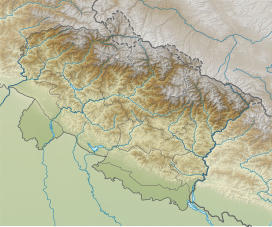| Adi Kailash | |
|---|---|
 | |
| Highest point | |
| Elevation | 5,945 m (19,505 ft)[1] |
| Coordinates | 30°19′09″N 80°37′57″E / 30.319137°N 80.632568°E |
| Geography | |
| Location | Pithoragarh district, Uttarakhand, India |
| Parent range | Himalayas |
| Climbing | |
| First ascent | 8 October 2004[2][3] |
| Easiest route | Southwest ridge: glacier/snow/rock climb (PD+/AD-) |
Adi Kailash (Kumaoni: आदि कैलाश), also known as Shiva Kailash, Chota Kailash, Baba Kailash or Jonglingkong Peak, is a mountain located in the Himalayan mountain range in the Pithoragarh district of Uttarakhand, India.[4] It is the second most important peak among the group of five separate peaks in Himalayas in separate locations collectively known as the Panch Kailash or "Five Kailashas", others being Mount Kailash in the first place, Shikhar Kailash (Shrikhand Mahadev Kailash) in the third, Kinnaur Kailash in the fourth and Manimahesh Kailash in the fifth place in terms of importance.[5] Gauri Kund (Jolingkong Lake) and Parvati Tal glacial lakes are at the base of the Adi Parvat.[6]
Adi Kailash and Limpiyadhura Pass (further northwest of Adi Kailash) are both located northwest of Gunji. The Lipulekh Pass, Old Lipulekh Peak, and Om Parvat (southwest of Lipulekh Pass) are located northeast of Gunji. Adi Kailash base camp, near the Hindu Shiva temple on the banks of sacred Jolingkong Lake (Gauri Kund), is located 17 km northwest of Kuthi (Kuti) village in Kuthi Yankti Valley (Kuthi or Kuti Valley).[4] The Adi Kailash Yatra Circuit route-1 via Gunji, the eastern-southeastern route, is reached by the Pithoragagh-Lipulekh Pass Highway (PLPH) and its Gunji-Lampiya Dhura Pass Road (GLDPR) paved motorable spur via Kuthi Yankti Valley from Gunji to Adi Kailash.[4] The permits for this route are issued at Dharchula and medical check-up is conducted there. The homestay accommodation is available in the villages along the route in Gunji, Napalachchu, Nabhi, Juli Kong and Kuti.[6] The Adi Kailash Yatra Circuit route-2 via Darma Valley, the western-southwestern route, begins by going up the Darma Valley and then crossing the Sin La pass south of Brahma Parvat to go to Kuthi Yankti Valley to Jolingkong Lake Base Camp. Many travellers who take the route-2, after the Adi Kailash darshan, choose to traverse the route-1 in reverse direction till Gunji where they can join the Om Parvat and Mount Kailash-Lake Manasarovar Tibetan pilgrimage route along the Sharda River (Kali River).[4] Kailash-Mansarovar, Adi Kailash, and Om Parvat are sacred to Hindus.[7]
- ^ Cite error: The named reference
aaj_2015was invoked but never defined (see the help page). - ^ Cite error: The named reference
aaj_2005was invoked but never defined (see the help page). - ^ Cite error: The named reference
hj_2007was invoked but never defined (see the help page). - ^ a b c d Cite error: The named reference
LK1was invoked but never defined (see the help page). - ^ Cite error: The named reference
pkaiad1was invoked but never defined (see the help page). - ^ a b कहां है भारत का 'कैलाश', जहां 15000 फीट की ऊंचाई पर पीएम मोदी ने लगाया था ध्यान, News1i, 12 October 2023.
- ^ Cite error: The named reference
aaj_2003was invoked but never defined (see the help page).

